A New York City nonprofit provides weekly groceries and hot meals to Asian elders, building its own supply chains and invigorating Asian-owned restaurants, grocery stores, and farms.

A New York City nonprofit provides weekly groceries and hot meals to Asian elders, building its own supply chains and invigorating Asian-owned restaurants, grocery stores, and farms.
June 9, 2025
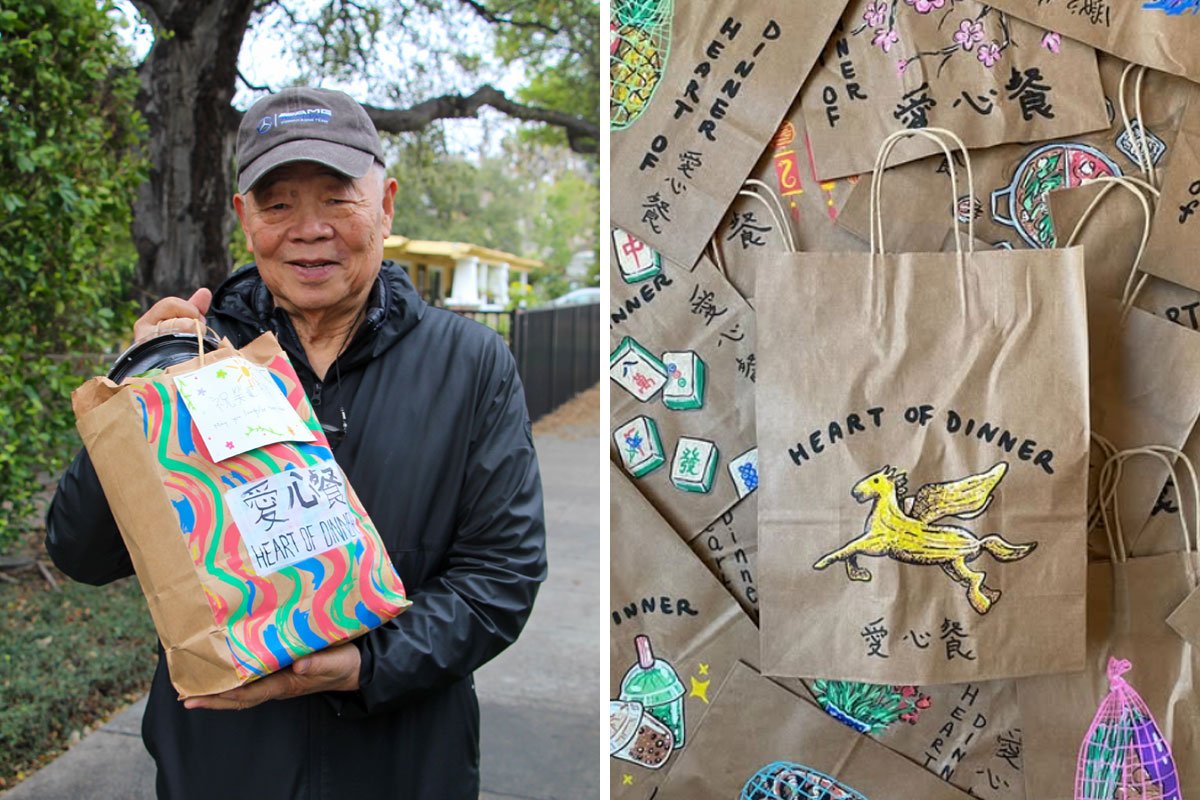
An elder in Los Angeles receives a Heart of Dinner care package. (Photo credit: Rebecca Ip). Heart of Dinner bags are decorated with uplifting imagery and words of encouragement. (Photo courtesy of Heart of Dinner)
Ten years ago, Yin Chang and Moonlynn Tsai hosted a supper club in their modest Los Angeles apartment. A dozen or so people—mostly friends of friends in the Asian community—would crowd around a custom-built 7-foot-long communal table and feast on dishes like char siu ribs marinated with whiskey or share elaborate hot-pot meals with greenmarket vegetables.
Expand your understanding of food systems as a Civil Eats member. Enjoy unlimited access to our groundbreaking reporting, engage with experts, and connect with a community of changemakers.
Already a member?
Login
Tsai, who grew up in a restaurant family and is herself a restaurateur and entrepreneur, handled most of the kitchen duties, while Chang, an actor best known for her portrayal of Nelly Yuki on the hit show Gossip Girl, would entertain guests in the dining room.
As a young couple, the two found comfort in bringing together strangers over a home-cooked meal—a communal experience they felt was lacking in their lives at the time.
“Elders like us, if we have any pain or don’t feel very well that day, we cannot go out to get anything.”
“Dinners can bring together people of all cultures and also [present] an opportunity to talk about who we are as people, our heritage, and our love stories,” Chang says. “When we were deciding on a name for our supper club, we were trying to figure out what was at the heart of dinner, and the name ‘Heart of Dinner’ became so fitting.”
Admission to these dinners was free, but guests were invited to leave donations in a large urn on the table, with proceeds going to No Kid Hungry, a child hunger campaign that supports school and community meal programs.
Heart of Dinner’s core mission took a dramatic turn during the pandemic. Chang and Tsai, who moved to New York City in 2018 to pursue career opportunities, were deeply troubled by the wave of Asian hate crimes and xenophobia that swept across the city in March 2020. After a period of feeling helpless, they sprang into action to mobilize support for the elderly Asian community. They partnered with local senior centers to hand-deliver bags of culturally appropriate groceries and ready-to-eat meals, prepared in their tiny home kitchen, to Asian elders isolated by the mandated quarantines. Within months, the couple were regularly delivering over 1,200 meals per week across New York City.
As threats to the Asian community lingered, Chang and Tsai formally established Heart of Dinner as a nonprofit in late 2020, garnering support from private donors; local, mostly Asian-owned businesses; corporate sponsorships; and foundation grants. Today, the organization continues to deliver over 700 care packages every week filled with fresh produce and hot meals to Asian seniors across four of New York City’s five boroughs. Later this year they plan to expand to Staten Island, with fundraising efforts already underway.
In April, Heart of Dinner celebrated its five-year anniversary. While volunteers from across New York City celebrated the milestone, Chang and Tsai were in Los Angeles, where they’ve lived intermittently since January, coordinating relief efforts for Asian seniors displaced by the catastrophic wildfires there (see sidebar below). They believe their experience in New York over the past five years helped them more quickly mobilize recovery efforts there.
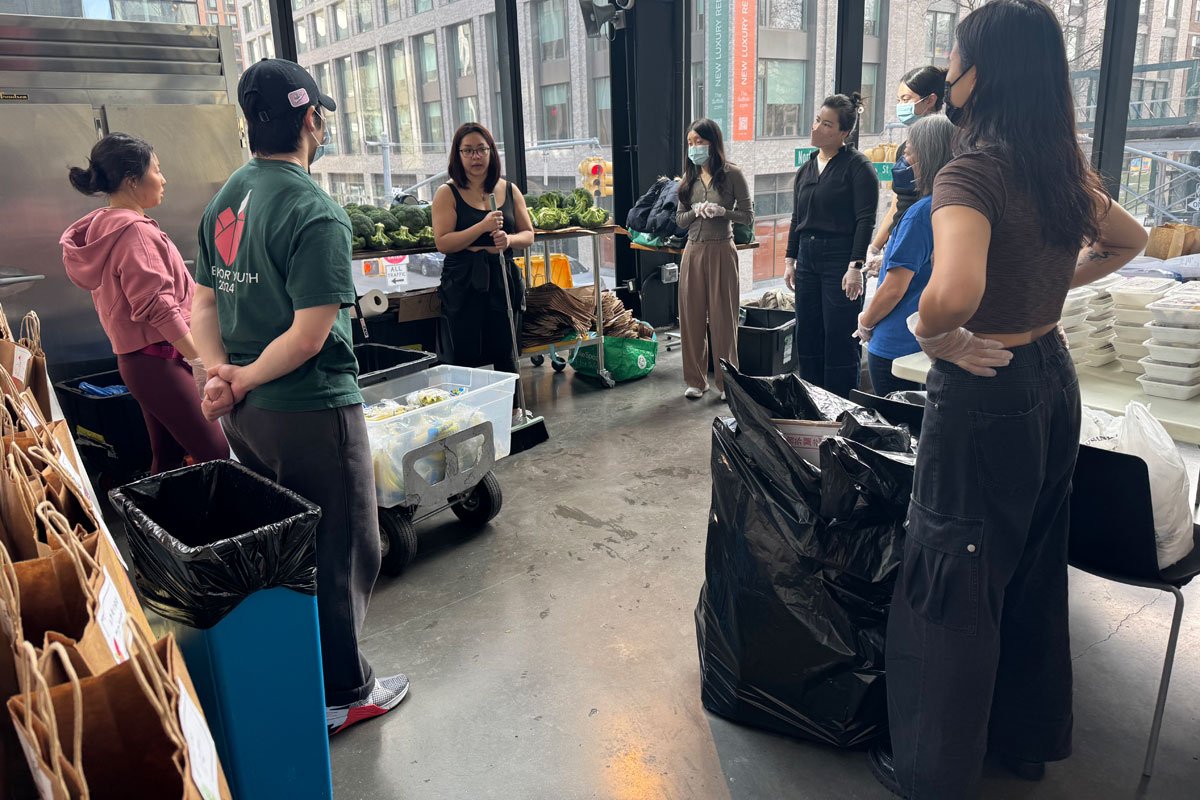
Heart of Dinner volunteers at the Lower East Side site organize deliveries for the day. (Photo credit: Adam Reiner)
“We did not see this coming,” Chang says, “but if anything, it was kismet, and poetic in [the] way that it reminded us of the heart of the mission and how necessary this work is, anywhere in the country.”
On a frigid Wednesday afternoon in February, about a dozen volunteers met at La Marqueta, a Latin food hall in East Harlem, to pack 75 gift bags with groceries like firm tofu, Japanese sweet potatoes, bok choy, and bananas, along with plastic to-go containers filled with stir-fried pork, purple eggplant, and white rice prepared by a partner restaurant in Chinatown. All meals included in Heart of Dinner care packages come from local Asian-owned restaurants.
Each bag, destined for Asian seniors living in nearby public housing, was festooned with colorful, uplifting artwork by volunteers from across the city: drawings and paintings of birds, lanterns, fruit, flowers, and other Asian-themed imagery. “Heart of Dinner” was written in Mandarin characters on the bags, with a personalized note stapled beneath the handle.
The notes included simple wishes for health and prosperity written in each recipient’s native language—in many cases, messages one would expect a grandparent to give, not receive: “Make sure you drink water” or “Please eat well today.” Two of the bags had notes written in Thai; other Heart of Dinner sites also prepare notes in Cantonese, Japanese, Korean, Vietnamese, and Tagalog.
The volunteers at the East Harlem site came from all walks of life: college students, bartenders, musicians, physician assistants, and retirees. After loading the care packages into large stroller wagons, the team divided into small groups, traversing the neighborhood’s intricate web of public housing developments by foot.
The volunteers warmly greeted each elder at the door, wearing masks as a precautionary measure, and presented the bags respectfully with two hands. They inquired with genuine concern about each person’s health, as a grandchild would. Most conversations were brief but cordial and ended with gentle bows and exchanges of “xiè xie” (“thank you” in Mandarin) with the many Chinese recipients who live in the area.
East Harlem, which spans from 103rd to 125th street on the east side of northern Manhattan, is a predominantly Latinx neighborhood. But according to the most recent Census Bureau data, Asians now comprise about 9.6 percent of its population, up from only 5.5 percent in 2010.
Due to gentrification, many Asian seniors in New York City are being displaced from Chinatown, forcing them to relocate to neighborhoods like Harlem in search of more affordable housing. The Heart of Dinner founders stressed that this can be particularly isolating for many elders, because these neighborhoods often don’t have familiar Asian businesses that cater to their needs.
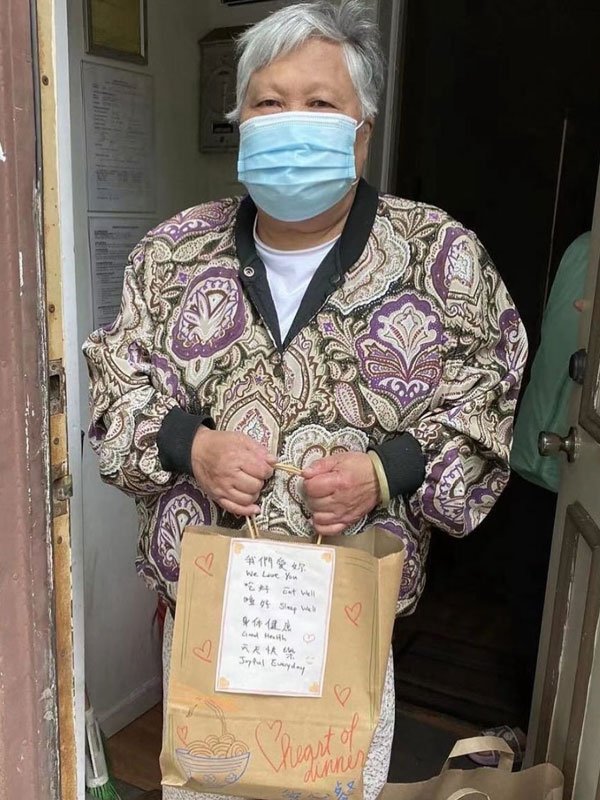
An elder in Brooklyn receives her weekly Heart of Dinner delivery. (Photo courtesy of Heart of Dinner)
In one of the high-rise public housing developments along the end of the route, a soft-spoken 73-year-old woman who introduced herself as Mrs. Xie extolled the virtues of Heart of Dinner through a translator. “I feel so thankful from the bottom of my heart,” she said of the weekly deliveries she’d been receiving for months. “Elders like us, if we have any pain or don’t feel very well that day, we cannot go out to get anything.”
Another elderly woman, whose husband is in his 90s, joked, “even our children don’t go above and beyond like Heart of Dinner does for us every week.”
Although Heart of Dinner’s primary mission is to advocate for the Asian elder community, it also provides vital support for many Asian-owned businesses by partnering with local restaurants, wholesale grocers, and organic farmers. “We intentionally purchase from Asian-owned businesses wherever possible, which also helps to build economic resilience in the communities we serve,” Chang says.
In 2023, they began partnering with Choy Commons, an organic farm collective in the Catskills, to supply their East Harlem site with Asian heritage crops such as baby Shanghai bok choy and hakurei turnips.
“The reality of many Asian seniors living in food insecurity is painful,” says Nicole Yeo-Solano, co-founder of Choy Commons, “especially because so many of us were raised by our grandparents, and we know that many of their journeys have not been easy.”
Heart of Dinner also works with Asian-owned restaurants and bakeries across New York City like Saigon Social and Partybus Bakeshop on the Lower East Side, which provide hearty soups and scallion buns, respectively, for their weekly deliveries. They also purchase freshly made soy milk from Fong On, New York City’s oldest tofu shop, which opened in Chinatown in 1933.
Pei Wei, the co-owner of Zaab Zaab, a Thai restaurant in Williamsburg, has supported Heart of Dinner since the pandemic, and her kitchen staff continues to supply over 100 hot meals every week for the Brooklyn delivery site.
“I tell the chef to cook the vegetables a little longer so it’s softer for people who have sensitive teeth,” Wei says, “or to chop the meat into smaller pieces so it’s easier to digest.” Her restaurant also frequently hosts bag decorating sessions, where young children like Wei’s 10-year-old daughter are invited to participate.
“We’re very proud that every single meal we serve with our partners is paid for by Heart of Dinner, at least what the restaurant would be charging,” Tsai says. “So, they’re able to partake in community giving while also doing something that helps sustain their business.”
For many volunteers, working with Heart of Dinner has helped foster a deeper connection to the Asian community and their own Asian identities. Professional illustrator Nancy Pappas began volunteering and helping decorate bags and notecards in 2020, after feeling horrified by violence against the Asian American and Pacific Islander community in New York City during the pandemic.
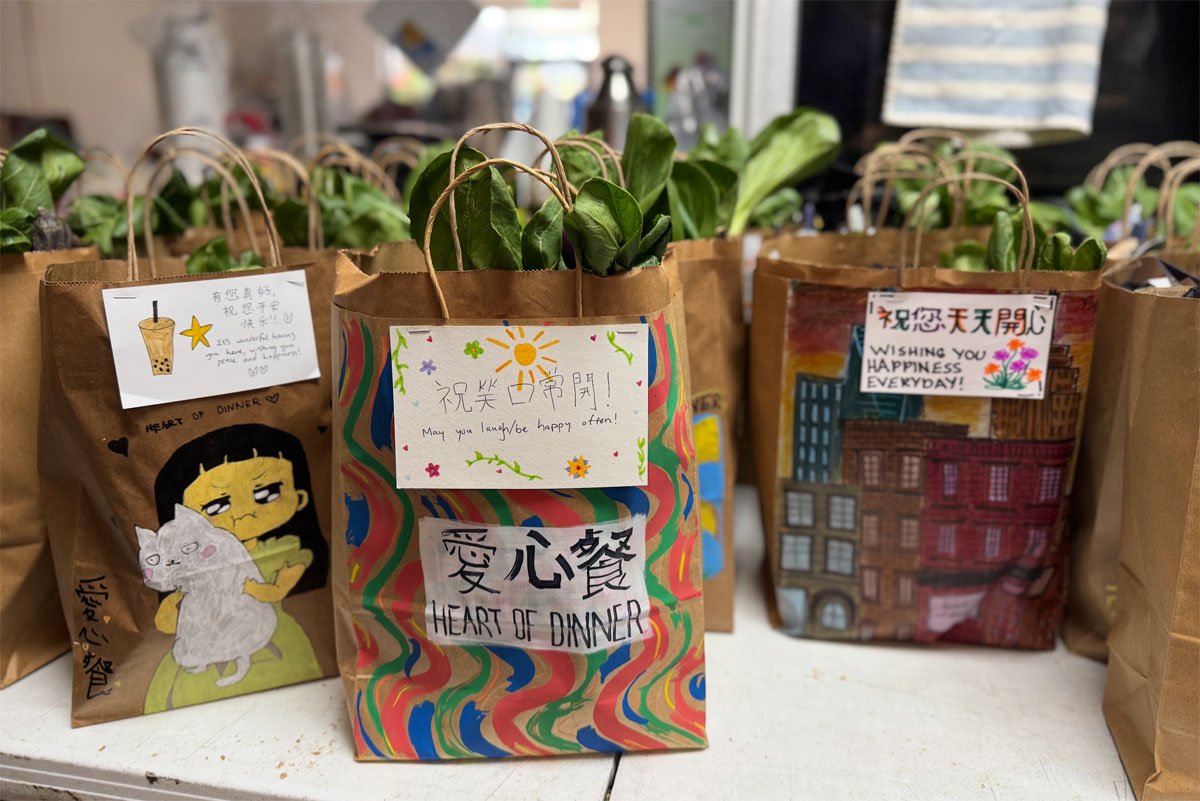
Brightly decorated Heart of Dinner bags are filled with fresh produce and prepared meals. (Photo courtesy of Heart of Dinner)
Pappas is an adoptee who was born in Korea and raised by a white family in Kansas City, Missouri. Having struggled with her own Asian identity growing up, she credits Heart of Dinner with helping further her journey of self-discovery. Her experiences with the nonprofit even encouraged her to seek out her Korean birth mother, whom she met in person in 2019, and spend extended time living in Asia.
“To be able to give back to the community—even though as an adoptee I don’t always feel like I belong at times—gives me a place and a purpose,” Pappas says. She attends at least three bag decorating sessions per month at Heart of Dinner’s Lower East Side volunteer site.
Hong Kong native Zoe Lau, who works part-time with Heart of Dinner as a volunteer communications coordinator, speaks fluent Cantonese and Mandarin and spends several hours every week calling elder beneficiaries to confirm their weekly deliveries in their native languages. She began attending weekly bag decorating sessions in New York City during the pandemic to feel closer to her grandmother in Hong Kong, who she was unable to visit due to COVID-19 travel restrictions.
“Since I couldn’t fly back to see her, I went in every Wednesday as much as I could, keeping in mind that if my grandma didn’t have anyone around to look after her, I would be very upset,” Lau says. “I hoped we could be those other grandchildren for these seniors.”
To see Heart of Dinner in action, check out this video on their Instagram.
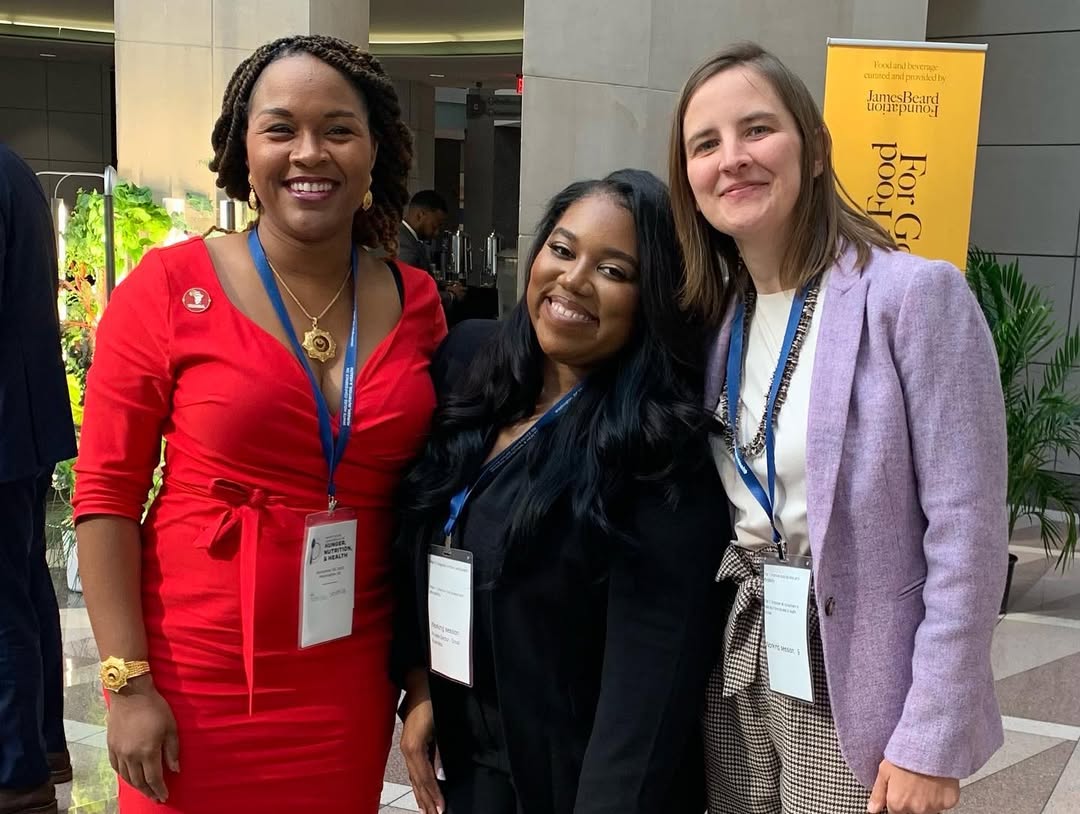
July 30, 2025
From Oklahoma to D.C., a food activist works to ensure that communities can protect their food systems and their future.
Leave a Comment